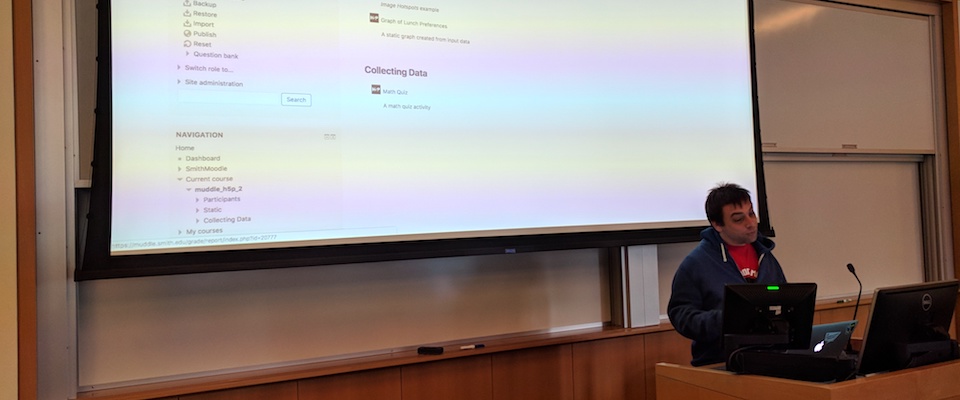
Work on the task list continued during Day 2 of the Moodle Hack/Doc Fest at Brandeis University, punctuated by three lunchtime presentations from members of the community.
Lunchtime presentations
Joe Bacal from Smith College presented on H5P and how they’re using it at Smith. H5P is an interactive, web-based content authoring tool. We kicked the tires on it at Hampshire College in 2017, and again at Lafayette College in 2018. Students at Smith used H5P in WordPress to create a spatial representation of a story’s plot. The use case for Moodle is different, because authoring is restricted to teachers. One useful way for teachers to leverage H5P content is to create quizzes. These integrate seamlessly with the Moodle grade book. In response to concerns from some of the attendees, Joe noted that H5P has published a guide on the accessibility of its various components.
Kevin Wiliarty from Hampshire College provided an update on the state of the Filtered Course List block. Filtered Course List provides a curated list of courses for faculty and students which is less cluttered than the traditional course list block. New features include listing courses based on enrollment method, support for starred courses, and persisting tree expansion between page reloads.
Finally, Andrew Reuther from Swarthmore College demonstrated the latest improvements in Swarthmore’s PDF accessibility tool. The tool scans uploaded PDFs and checks for various accessibility features, including title, outline, language, and the presence of OCR text. A block exposes the information on a per-course basis to instructors. New functionality will allow instructors to “repair” inaccessible PDFs within Moodle, without uploading a new file. Using Ghostscript, which is installed on most Moodle servers by default, an instructor can set the title and language, after which the PDF will be recreated and updated. In addition, Swarthmore is using its subscription to SensusAccess to scan and generate OCR text for PDFs which don’t have them. In addition, Swarthmore is adding site-wide administrator reporting tools.
From the task list
We continued to work on yesterday’s tasks and added a few new ones:
Copy and paste of images from one WYSIWYG window to another
This is another new feature in Moodle 3.6, and one with a strong CLAMP pedigree. If you copy/cut text and images from one editor window (either Atto or TinyMCE) to another, it appears to work for a short period of time but then subsequently returns a broken image. This was a complicated bug which had to do with how Moodle handles drafts. Charles Fulton (Lafayette College) and Willy Lee (then at Carleton College) first reported the bug in April 2014, during CLAMP’s Development Workshop at Smith College. CLAMP’s proposed fix, after many revisions, was included in the Moodle 3.6 release and works as expected. Copying and pasting images from one editor window to another will no longer result in a broken image.
Live quiz report
This is a quiz report plugin developed by Bill Junkin at Eckerd College. A teacher may view a live spreadsheet showing student’s answers to a quiz, while the quiz is in progress. Possible use cases include teachers monitoring students’ progress during labs or teachers identifying students who need assistance in flipped classroom scenarios. The plugin worked out of the box; we used it to provide a live readout on where attendees wished to have dinner.
Hack/Doc Fest Winter 2019 at Brandeis University: Event page | Sprint | Day 1 | Day 2 | Day 3
